Edmund Husserl (1859-1938) is the main founder of phenomenology – and thus one of the most influential philosophers during the 20th century. He has made seminal contributions to a wide range of philosophy areas, and has anticipated some of the key ideas in neighboring disciplines, such as linguistics, sociology, and cognitive psychology.
Husserl was born on April 8th, 1859 in Prossnitz, Moravia. Husserl’s parents were not orthodox Jews, but he and his wife later converted to Protestantism. As a child, he survived the first world war with his family, and lost a sibling as well.
During Husserl’s time at Leipzig University in 1876-78, he took courses in mathematics, physics, and philosophy. Among other things, he listened to Wilhelm Wundt’s lectures on philosophy. Wundt was the founder of the first institute for experimental psychology. His first mentos was Thomas Masaryk, Brentano’s student, who became the first president of Czechoslovakia. From 1870-81, Husserl continued his studies in the same fields in Berlin and moved to Vienna later where he completed a PhD in mathematics in 1883.
After that he returned to Berlin, becoming Weierstrass’ assistant. When Weierstrass became seriously ill, Masaryk suggested that Husserl go back to Vienna, to continue his studies with Franz Brentano, the author of “Psychology From An Empirical Standpoint.” After a brief military service in Vienna, Husserl followed Masaryk’s advice and studied with Brentano in 1884-86. Brentano’s lectures on psychology and logic had a lasting impact on Husserl, who saw them as a key part of his ongoing quest for a strictly scientific philosophy. Brentano recommended Husserl to his pupil Carl Stumpf in Halle, who is known for his work in “Psychology of Tone.” This recommendation from Husserl’s advisor helped him to prepare and submit his habilitation dissertation “On the Concept of Number” in 1887 with Stumpf.
The thesis that was later integrated into Husserl’s first published monograph, Philosophy of Arithmetic, was first published in 1891. In this work, Husserl combined his mathematical, psychological, and philosophical expertise in an attempt to provide a psychological foundation for arithmetic. The book was met with criticism for its underlying psychology in a review by Gottlob Frege and Husserl took that criticism very seriously, although it’s far from clear that the author of both Husserl and Frege regarded logic as a branch of psychology the same way, as “strong psychologism” would have it. In any case, Husserl sharply criticized this kind of psychologism and developed the philosophical method that is famous today – phenomenology.
In the first decade of the 20th century, Husserl published two volumes on phenomenology, refining his method and calling it “transcendental phenomenology”. Husserl’s work on logic and philosophy in Göttingen received great acclaim from fellow professors, who helped him secure an associate professorship there. Thanks to this support, Husserl was able to continue developing his ideas. From 1910-1913, he served as founding editor of Logos and the Yearbook for Phenomenology and Phenomenological Research. In his programmatic article “Philosophy as a Rigorous Science,” he critiqued naturalism. Husserl remained in Göttingen until 1916. He made his most important philosophical discoveries with the transcendental-phenomenological method, which allows him to explore the nature of consciousness and experience.
Husserl retired in 1928, and his successor was his former assistant Martin Heidegger. In 1933, Adolf Hitler took control of Germany and because of his Jewish ancestry, he experienced increasing levels of humiliation and isolation. In 1935, he gave a series of lectures in Prague that resulted in his last major work, The Crisis of European Sciences and Transcendental Phenomenology.
In 1938, Edmund Husserl died in Freiburg and Herman Leo Van Breda was responsible for rescuing Husserl’s manuscripts and bringing them to Leuven, where the first Husserl archive was founded in 1939.


